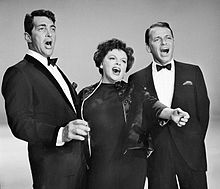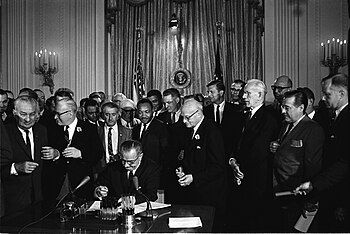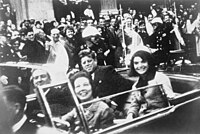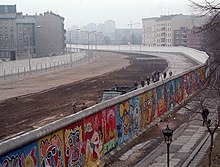Portal:1960s
The 1960s Portal
The 1960s became synonymous with the new, radical, and subversive events and trends of the period. In Africa the 1960s was a period of radical political change as 32 countries gained independence from their European colonial rulers. Some commentators have seen in this era a classical Jungian nightmare cycle, where a rigid culture, unable to contain the demands for greater individual freedom, broke free of the social constraints of the previous age through extreme deviation from the norm. Christopher Booker charts the rise, success, fall/nightmare and explosion in the London scene of the 1960s. However, this alone does not explain the mass nature of the phenomenon. Several nations such as the U.S., France, Germany and Britain turned to the left in the early and mid 1960s. In the United States, John F. Kennedy, a Keynesian and staunch anti-communist, pushed for social reforms. His assassination in 1963 was a stunning shock. Liberal reforms were finally passed under Lyndon B. Johnson including civil rights for African Americans and healthcare for the elderly and the poor. Despite his large-scale Great Society programs, Johnson was increasingly reviled by the New Left at home and abroad. The heavy-handed American role in the Vietnam War outraged student protestors across the globe, as they found peasant rebellion typified by Ho Chi Minh and Che Guevara more appealing. Italy formed its first left-of-center government in March 1962 with a coalition of Christian Democrats, Social Democrats, and moderate Republicans. Socialists joined the ruling block in December 1963. In Britain, the Labour Party gained power in 1964. In Brazil, João Goulart became president after Jânio Quadros resigned. This is a Featured article, which represents some of the best content on English Wikipedia..
 The 1969 Curaçao uprising (Papiamento: Trinta di Mei, 'Thirtieth of May') was a series of riots on the Caribbean island of Curaçao, then part of the Netherlands Antilles, a semi-independent country in the Kingdom of the Netherlands. The uprising took place mainly on May 30, but continued into the night of May 31 – June 1, 1969. The riots arose from a strike by workers in the oil industry. A protest rally during the strike turned violent, leading to widespread looting and destruction of buildings and vehicles in the central business district of Curaçao's capital, Willemstad. Several causes for the uprising have been cited. The island's economy, after decades of prosperity brought about by the oil industry, particularly a Shell refinery, was in decline and unemployment was rising. Curaçao, a former colony of the Netherlands, became part of the semi-independent Netherlands Antilles under a 1954 charter, which redefined the relationship between the Netherlands and its former colonies. Under this arrangement, Curaçao was still part of the Kingdom of the Netherlands. Anti-colonial activists decried this status as a continuation of colonial rule but others were satisfied the political situation was beneficial to the island. After slavery was abolished in 1863, black Curaçaoans continued to face racism and discrimination. They did not participate fully in the riches resulting from Curaçao's economic prosperity and were disproportionately affected by the rise in unemployment. Black power sentiments in Curaçao were spreading, mirroring developments in the United States and across the Caribbean, of which Curaçaoans were very much aware. The Democratic Party dominated local politics but could not fulfill its promise to maintain prosperity. Radical and socialist ideas became popular in the 1960s. In 1969, a labor dispute arose between a Shell sub-contractor and its employees. This dispute escalated and became increasingly political. A demonstration by workers and labor activists on May 30 became violent, sparking the uprising. (Full article...)This is a Good article, an article that meets a core set of high editorial standards.
 The Judy Garland Show is an American musical variety television series that aired on CBS on Sunday nights during the 1963–1964 television season. Despite a sometimes stormy relationship with Judy Garland, CBS had found success with several television specials featuring the star. Garland, who for years had been reluctant to commit to a weekly series, saw the show as her best chance to pull herself out of severe financial difficulties. Despite it being cancelled relatively early on, it is now revered and considered an important piece of television history. Production difficulties beset the series almost from the beginning. The series had three different producers in the course of its 26 episodes and went through a number of other key personnel changes. With the change in producers also came changes to the show's format, which started as comedy and variety but switched to an almost purely concert format. (In fact, as of episode 20, the on-screen title of the show became Judy Garland In Concert.) (Full article...)Selected picture - United States President Lyndon B. Johnson (seated) signs the Civil Rights Act of 1964, a landmark piece of legislation that outlawed racial segregation in schools, public places, and employment. Among the guests behind him is Martin Luther King Jr. (directly behind and to the right of Johnson).
Did you know -
Related portalsThis is a Featured article, which represents some of the best content on English Wikipedia..
John Herschel Glenn Jr. (July 18, 1921 – December 8, 2016) was an American Marine Corps aviator, astronaut, businessman, and politician. He was the third American in space, and the first American to orbit the Earth, circling it three times in 1962. Following his retirement from NASA, he served from 1974 to 1999 as a U.S. Senator from Ohio; in 1998, he flew into space again at the age of 77. Before joining NASA, Glenn was a distinguished fighter pilot in World War II, the Chinese Civil War and the Korean War. He shot down three MiG-15s, and was awarded six Distinguished Flying Crosses and eighteen Air Medals. In 1957, he made the first supersonic transcontinental flight across the United States. His on-board camera took the first continuous, panoramic photograph of the United States. (Full article...)This is a Good article, an article that meets a core set of high editorial standards.
Stanley Kubrick (/ˈkuːbrɪk/; July 26, 1928 – March 7, 1999) was an American filmmaker and photographer. Widely considered one of the greatest filmmakers of all time, his films were nearly all adaptations of novels or short stories, spanning a number of genres and gaining recognition for their intense attention to detail, innovative cinematography, extensive set design, and dark humor. Born and raised in New York City, Kubrick was an average school student but displayed a keen interest in literature, photography, and film from a young age; he began to teach himself all aspects of film producing and directing after graduating from high school. After working as a photographer for Look magazine in the late 1940s and early 1950s, he began making low-budget short films and made his first major Hollywood film, The Killing, for United Artists in 1956. This was followed by two collaborations with Kirk Douglas: the anti-war film Paths of Glory (1957) and the historical epic film Spartacus (1960). (Full article...)Selected article -The Berlin Wall (German: Berliner Mauer, pronounced [bɛʁˌliːnɐ ˈmaʊɐ] ⓘ) was a guarded concrete barrier that encircled West Berlin of the Federal Republic of Germany (FRG; West Germany) from 1961 to 1989, separating it from East Berlin and the German Democratic Republic (GDR; East Germany). Construction of the Berlin Wall was commenced by the government of the GDR on 13 August 1961. It included guard towers placed along large concrete walls, accompanied by a wide area (later known as the "death strip") that contained anti-vehicle trenches, beds of nails and other defenses. The primary intention for the Wall's construction was to prevent East German citizens from fleeing to the West. The Soviet Bloc propaganda portrayed the Wall as protecting its population from "fascist elements conspiring to prevent the will of the people" from building a communist state in the GDR. The authorities officially referred to the Berlin Wall as the Anti-Fascist Protection Rampart (German: Antifaschistischer Schutzwall, pronounced [antifaˌʃɪstɪʃɐ ˈʃʊtsval] ⓘ). The West Berlin city government sometimes referred to it as the "Wall of Shame", a term coined by mayor Willy Brandt in reference to the Wall's restriction on freedom of movement. Along with the separate and much longer inner German border, which demarcated the border between East and West Germany, it came to symbolize physically the Iron Curtain that separated the Western Bloc and Soviet satellite states of the Eastern Bloc during the Cold War. (Full article...)More Did you know (auto generated)
TopicsCategoriesWikiProjects
Associated WikimediaThe following Wikimedia Foundation sister projects provide more on this subject:
Discover Wikipedia using portals |





























